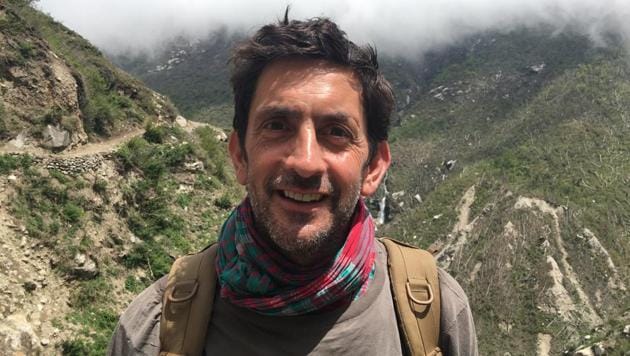When Sidney Rowlatt’s great-grandson, Justin, wept during Jallianwala Bagh visit
Justin Rowlatt, great-grandson of Sir Sidney Rowlatt, who was architect of infamous Rowlatt Act, remembers how appalling were consequences of 1919 massacre.
He was not expecting to react as strongly as he did when he visited Jallianwala Bagh in 2017. In a candid account in his memoir ‘Sins of the Great-Grandfather’, Justin Rowlatt says: “I certainly wasn’t expecting to cry. I‘d imagined I’d struggle to connect with the horror, that it would seem abstract; an episode from a distant history. But even after ninety-eight years, the garden is resonant with its memory. When you see the bullet holes that pock the wall, or peer into the well where so many had died, you can’t help but imagine the terror the protestors must have felt”.

But his tears hijacked him when time came to say goodbye to Sukumar Mukherjee, chairperson, Jallianwala Bagh Board, who had taken him for a personal tour. “As I thanked him for his hospitality, my voice began to falter and I began to weep.” What further amazed Justin was that Sukumar was not surprised at this outburst. Sukumar had seen it too often as it was common for Indians and Britishers alike to be overcome by emotion when they looked at this sad page of history at Jallianwala Bagh.
However, Justin says, “I had more reasons than most to feel ashamed and humbled by what had happened at the Bagh.” Justin, a journalist by profession and known as a man of ethics, was posted in India and stationed at Delhi for two years as the BBC South Asia correspondent in 2015.
He was conscious that the draconian Rowlatt Act was inspired and named after his great-grandfather Sir Sydney Rowlatt (1862-1945). It was against this ‘Black Act, as Mahatma Gandhi was to later call it, that people had gathered to protest against at the Jallianwala Bagh.
This essay is included in the English version of famous Punjabi writer Nanak Singh’s ode to the massacre written in 1920 and banned by the colonial British government.
Navdeep Suri, grandson of Nanak Singh, who has translated the long poem into English, says: “While doing research for the book on the Rowlatt Act, I stumbled upon the name of Justin Rowlatt. I got in touch with him, explained the project and asked if he would contribute his unique perspective for the book. He readily agreed and I waited with bated breath not sure of what I would get!”
However, all of Navdeep’s worries were put to rest when he got the first draft of the writer’s empathetic and historical perspective.
Sir Sydney Rowlatt had died long before Justin was born in 1966 and he says, “In the one sepia-tinged picture I have of him he is a figure from an elderly and rather rakish-looking gentleman.”
However, the Rowlatt Act and its repercussions weighed on Justin’s mind when he moved to Delhi to work in the BBC office, but he was surprised that this did not matter to the Indians he interacted with, in spite of the name he carried.
In fact, he got a warm response and puzzling over it, he writes, “I wasn’t certain my compatriots would be so generous to the relative of an Indian, who had been instrumental in prompting the slaughter of hundreds of British people.”
The answer came to him in a backhanded compliment given to him by Tushar Gandhi, grandson of Mahatma Gandhi, who said while shaking hands with him: “I appreciate your great-grandfather’s role to provide the first nail in the coffin of the Empire.”



